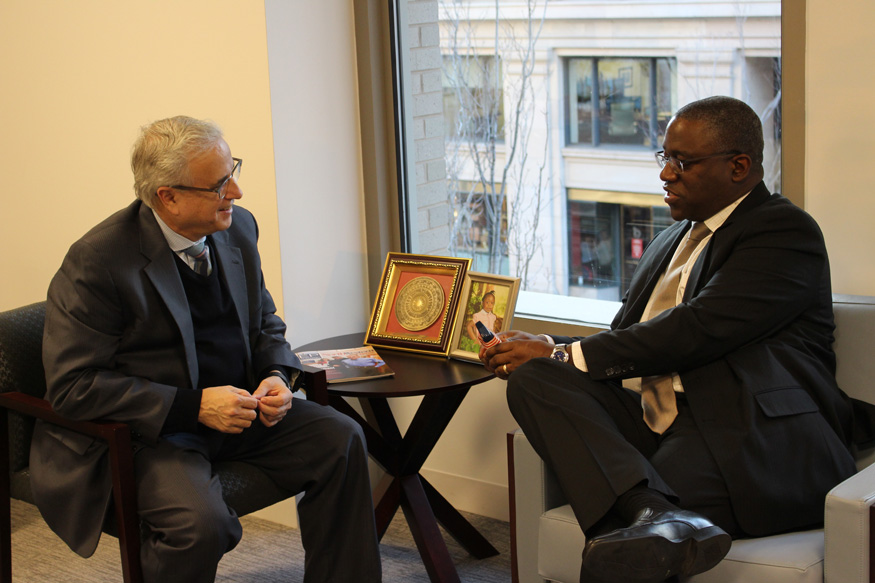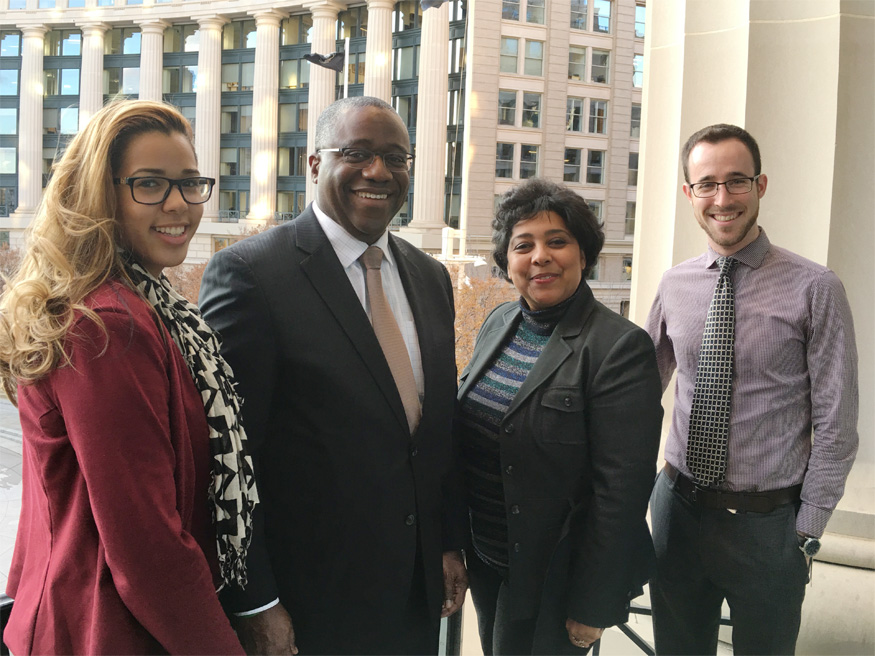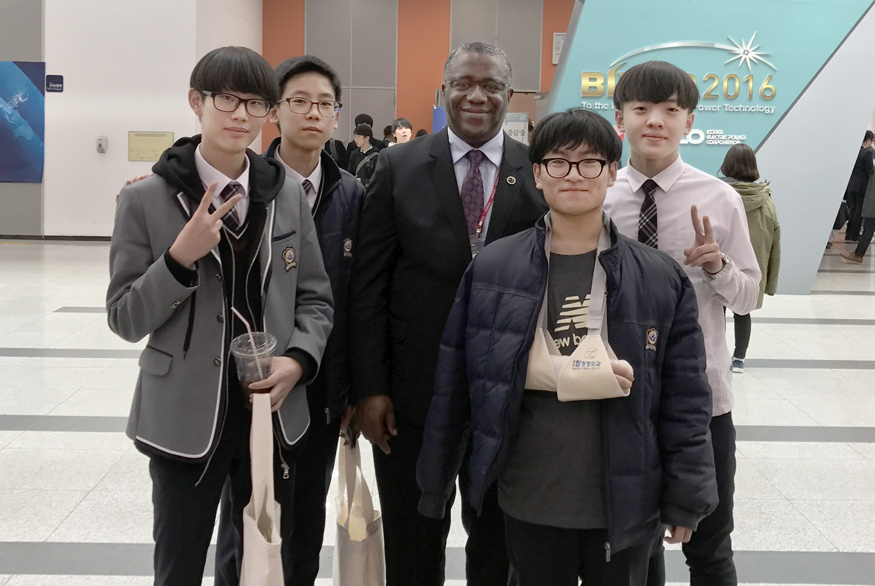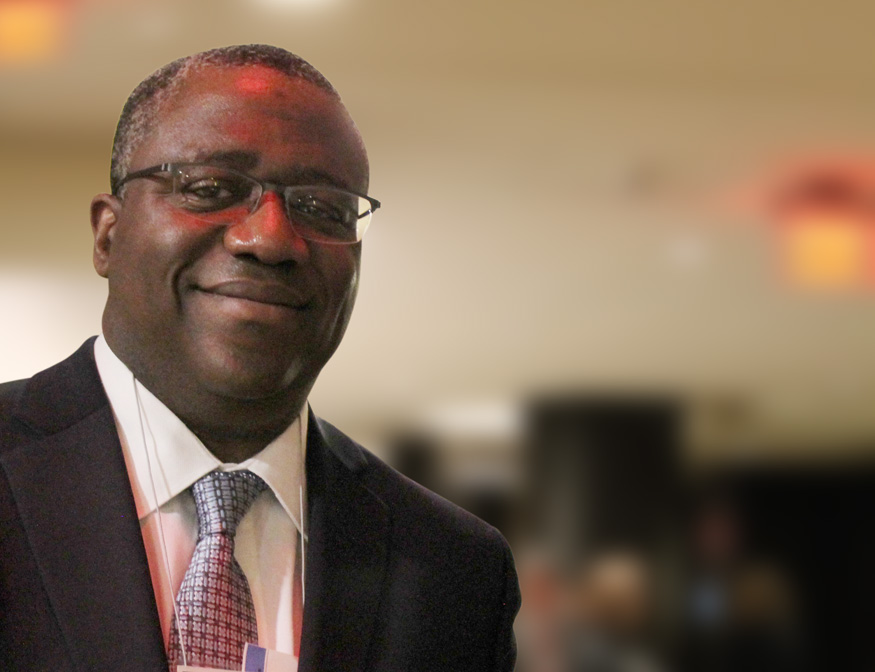We talked with Lawrence Jones, the Edison Electric Institute's Vice President for International Programs
Lawrence Jones joined the Edison Electric Institute a year ago as the association's vice president for international programs. He had been North America vice president for utility innovation and infrastructure resilience at Alstom Grid Inc., and also vice president for policy, regulatory affairs and industry relations for Alstom.



Lawrence Jones joined the Edison Electric Institute a year ago as the association's vice president for international programs. He had been North America vice president for utility innovation and infrastructure resilience at Alstom Grid Inc., and also vice president for policy, regulatory affairs and industry relations for Alstom.
Jones was born and raised in Monrovia, Liberia. He lived in Sweden for more than a decade, where he received his M.Sc. in electrical engineering and his Ph.D. in power systems engineering from the Royal Institute of Technology in Stockholm.
PUF's Steve Mitnick: What are some of the fun things about your job?
Lawrence Jones: I think there may be three. The first one is dealing with the uncertainty of having a strategic conversation with an electric company executive.
I craft and conduct strategic conversations with electric company executives around the world. The fun part is being able to sit here in Washington D.C., or wherever I may be, and prepare for a conference call or face-to-face meeting with an executive who I've probably never met.
What's fun is after all that preparation, if it's gone as expected, then I walk away with a sense of satisfaction that it was worth the effort. Success to me is not necessarily walking away with a new member [of EEI], but that the conversation has been a win-win for all parties.
It's that the structure of the conversation has met the expectation of the other person - member or non-member. Customer satisfaction, or executives being satisfied with the outcome of conversations we're having, is very good positive feedback.
Another thing that I find fun is the diversity of issues that EEI is dealing with, both domestic and internationally. The intellectual camaraderie that exists both here at EEI and with the representatives of member companies is stimulating. Everyone seems to be moving towards the same ultimate goal of providing safe, increasingly clean, reliable and affordable electricity to society, however, along different pathways.
Then, another real source of excitement is feeling a sense of purpose in what you are doing. I feel like I'm doing something that will have a lasting impact, way beyond this job.
I feel fortunate for the opportunities to have strategic conversations with industry leaders from different countries, especially in parts of the world where there is very limited access to electricity. That's a sense of purpose.
Previously in my career, I was "selling" technology. Now I'm almost seeing myself as kind of an electricity missionary. Missionaries are not there to just convert people. They are also there to fulfill a mission of changing the world. To some extent, that's something that really makes me feel joyful - imagine helping to light up the world.
As the CEO of a Japanese electric company recently told me, "electricity brings light to the heart of his customers." Imagine what joy that must bring.
Those are three fun things. I know they're not the typical fun things like biking, going to movies, etc., but there's an intellectual joy that comes with what I'm doing. I believe that having a "happy mind" is critically important in today's fast paced world.
PUF's Steve Mitnick: Being the international face for the U.S. industry and creating an international platform for everyone to talk and cooperate and work together, you're in an amazing position to have some impact globally. You must feel that.
Lawrence Jones: When you take on this kind of a job, you don't know what it's going to lead to. The job has so many different facets that come with it. When you sit back and realize the opportunity that comes with having such a platform, you also feel a sense of responsibility.
In this role, our non-U.S. electric company members expect us to reflect their perspectives here, and we have to represent the U.S. perspectives abroad. One has to remain cognizant that it is about creating opportunities for dialogues for addressing a broad range of issues that are relevant to all members.
An important difference between this job and others previously in my career is that now I am selling or advocating new approaches and solutions to address vexing challenges that are global in scale but local in character, and which ultimately affect the interest of a diverse group of stakeholders in many different countries. This is different from selling the same technology solution to many customers.
Selling ideas also requires connecting with the heart and soul of the other person. It is not just a cerebral process. EEI offers a unique platform to create opportunities for convening electric company leaders from around the world to discuss compelling issues affecting their businesses, and to share experiences.
PUF's Steve Mitnick: In your work, you have the opportunity to meet industry executives from different countries and cultures, and who have different expectations about what EEI provides. Can you talk about developing relationships and delivering value to such a wide array of companies?
Lawrence Jones: A key to success for the EEI international program is creating and delivering a value proposition that's unique for each company. It must also be one that has enough breadth that other electric companies can partake in it.
Electric companies from every continent are being brought together around a universal mission of providing increasingly clean, reliable, affordable electricity. However, each has a unique set of business objectives subject to their customers' and shareholders' expectations, as well as the regulatory conditions under which they must operate.
Furthermore, EEI international programs membership includes companies with diverse ownership - state-owned to investor-owned, and even municipal utilities. On building relationships, while one must understand the issues that are common to all the members, it is important to build trust on a personal level with executives by being responsive and delivering on your commitments. Like any human relationship, one way to maximize trust is to keep your word.
PUF's Steve Mitnick: How do you switch gears going from one country, or culture for that matter, to another and still try to connect with people?
Lawrence Jones: In general, it can be hard. But over time it's about having a flexible and adaptive mindset, and seeking consensus around what can be agreed upon that's a win-win for everyone.
Before accepting this job, I asked someone who's known me all my life to read the job description and give me their feedback. Their immediate response was, "Lawrence, when you were a young boy growing up in Liberia, whenever we moved into a neighborhood, you'd be the first to come home with a bunch of strangers. You would create these friends."
And then I was reminded that when playing with friends, whenever things began to get a bit rough, I would always be the one to say, hey guys, let's calm down. Let's discuss this. Interestingly enough, back then some of my friends saw me as the spoiler because they really wanted to get into a little fight. But then Lawrence came along wanting to find a consensus and work things out.
The more I reflect on the question, I think my life's journey has been preparing for a role like this.
From Liberia, I moved to Sweden, where the idea of finding consensus is something Swedes and their fellow Scandinavians have, in general, ingrained in their cultures. For fifteen-plus years, I went to school, and got my education, and got deeply immersed in the Swedish culture. So perhaps the art of consensus building got reinforced.
Ultimately, the key to successfully switching between and across cultures is about having a common language (spoken and unspoken) and how you communicate.
From Liberia to Sweden and Washington State, I have landed at EEI in a job where now I have to harmonize my conversation, as I engage on a regular basis with people from different countries and cultures to find solutions to address their specific challenges. In fact, sometimes it's even challenging switching conversations between individuals in the same country but from different electric companies.
For example, earlier this year I had a meeting in Adelaide, Australia with a number of electric company CEOs from Australia and New Zealand. I met them one-on-one, and as a group. The Australian CEOs came from New South Wales, Queensland, South Australia, Tasmania, and Victoria, respectively. These are five independent provinces with different regulatory structures, geographies and other realities.
So part of the switching is making sure to put the issues in the right local context even when dealing with companies in the same country.
Throughout my life it seems I have subconsciously been honing the skills of making these cultural switches. Today, when I travel to countries that are culturally very different, I get off the plane, make the switch and get into the flow. It doesn't matter whether I know the language or not.
I am often asked how I do it. I think it's because I have taught myself to realize that in spite of the geographical differences that separate nations of the world, there are actually more we have in common as humans than what makes us different. But, one of the greatest challenges facing humans is how to accept our commonness while at the same embracing the diverse tapestry that is defined by our uniqueness.
PUF's Steve Mitnick: How do you prepare?
Lawrence Jones: I spend a lot of time preparing. This is essential for the switching to occur naturally. My team will tell you that even before I get on a conference call, I need the background information about the CEO and others who will be participating, as well as any other valuable information about the company.
I particularly want to know what their issues are. I try to get enough information and study them before the call. Then when the call begins, I try to put myself in their situation, and make their issues my issues. It is hard to switch when you cannot relate to the situation and this becomes obvious if you have not taken the time to prepare.
I remember when I started at EEI a top priority was to have conversations with many CEOs of the international member companies, as a way of getting to know them and to familiarize myself with their issues.
On one such day, I had calls with four different executives in Asia, Australia, Canada and Europe, respectively. The calls were conducted within a couple of hours, but each required a great deal of preparation.
Although preparing before you have the conversation is important, more important is focusing on listening across cultures. For this, I have received much help from one of my true passions - music. For most of my life, I have had the opportunity to sing in many choirs and groups, performed solos before large and small audiences in different countries, including singing a duet with my wife at our wedding. I also directed choirs.
I believe that when you sing in or direct a choir, you develop a kind of listening skill that seeks to find harmony.
I think having a conversation is like singing with another person. If you can't reach the point of harmony, then you're not communicating. It just becomes noise.
The cultural switch occurs just as it does when I'm singing a new song. It might be a different language, but music is universal, and the basics are still there. The notes are the same notes although the structure may be different.
So that means when singing classical music I have to use a whole different part of my musical ability than when singing gospel music. But it's still music even if the lyrics are in English, Swedish, French or any other language for that matter. I still must listen in order to get to harmony! Sometimes all it takes is just finding that one missing note, or one shared value, or a common problem, to achieve harmony.
PUF's Steve Mitnick: What's another real-life example of this?
Lawrence Jones: It is often the case that I go into new environments, not knowing exactly everything that will happen, how I will respond, or what the outcomes will be.
For example I recently visited Mexico City. During the first dinner, exclusively Mexican cuisine was served, and the appetizers included fried grasshopper. At one of the lunches later that week I was offered two special treats - a traditional fried worm and ant eggs.
All three items were actually very tasty. In fact, the presentation and aroma was far more appealing than that of "Surströmming" - a traditional fermented Baltic Sea herring eaten especially in northern Sweden since the sixteenth century. I ate this on a number of occasions while in Sweden. The truth is both the Mexican and Swedish food culture experiences were aided by appropriate levels of tequila and the special Swedish liquor known as "brännvin," respectively.
Both of these experiences seeded a pathway to establishing personal connections, finding a point to harmony, with my Mexican and Swedish hosts. In this case, food became the common language. The flexible and adaptive mindset that caused the shift tells me that if my hosts can eat the grasshopper, worms, ant eggs, or even Surströmmingand survive, there's no reason why I couldn't eat it, except for me telling myself that I couldn't.
Another thing that I try to do to assist the switch is to read the local newspapers, even if I don't understand everything. People appreciate when you show interest in their country, community or culture. However, you have to be sincere about it.
PUF's Steve Mitnick: Like every job, there must be some difficult or challenging things about this job. Anything you'd like to share?
Lawrence Jones: The most challenging part of this job is being away from my family. So it is necessary to find that delicate balance. Even when I am not travelling, it occasionally involves conference calls at odd hours due to the time differences between Washington and the rest of the world.
Fortunately, I have very family-oriented bosses who are constantly asking about the family and are very keen to emphasize the importance of making sure the right balance is kept, with family always coming first and foremost. For example, when I come home from a long trip I take a few days to recover. This also allows me to just stay home, and enjoy the blessing of being a father and a husband.
PUF's Steve Mitnick: Your father was a real inspiration.
Lawrence Jones: Yes indeed both personally and professionally. For example, whenever we would travel, my father was so ingrained in electricity that even when passing areas with beautiful forests, he would spot transmission and distribution lines, or marvel over other electrical connections. He'd say, oh that's a very interesting connection. Look at that tower. Why is it designed like that?
I still remember once when he visited me in Sweden and we were driving in the countryside covered with snow to visit a family friend. The conversation was about underground cabling and how much that would cost in Liberia. For him electricity was more than just a career, it was an important part of his life.
One of the greatest inspirational moments from him took place about three days before he died. He called me into his hospice room. I sat by his bed side. In spite of his ailing health, he began to speak with a strong voice and said "Look son, I know you travel all over the world. But you have to make one promise to me."
I said, what's the promise? He said "Whatever you do, you have to try and see how we can bring electricity to Africa."
I said, yeah, yeah, yeah, assuming that he was joking. But he was very serious.
He said, "No, no, no. Lawrence, son, you have to promise me that. We have to electrify Africa and especially Liberia." You see, my father was one of Liberia's pioneering electrical engineers. He knew every aspect of the system. I have known no one in my lifetime that cared so much about and devoted much of his career to electrifying Liberia.
That conversation with my father in August of 2004 was more than a decade ago. Reflecting on that day and where we are today, I am reminded that life is a journey, and most times you set a goal, you're on a path but don't know all the twists and turns, or the potholes or bridges you'll encounter. But nature, fate, and divine providence have interesting ways of placing you on your ultimate path.
At this juncture in life, it feels like more of the pieces of the puzzle are coming together that might allow me to contribute to making my father's last wish on earth become a reality.
PUF's Steve Mitnick: And your mother?
Lawrence Jones: Throughout my life, my mother has constantly demonstrated the power of faith which drives positive thinking and action. In the midst of any adversity, her focus is always centered on believing that everything is possible if you try. More importantly, you must never forget your purpose and mission in life.
My mother's other influence on me is that one must never stop learning in life. She also taught us the importance of the universal golden rule; "Treat others as you would like for them to treat you." Together, these are guiding principles she lives by and I strive to do the same.
PUF's Steve Mitnick: Congratulations on your recent appointment as Honorary Industry Fellow at the Monash University, in Australia. What does this entail and will you be relocating to Melbourne?
Lawrence Jones: Monash University is one of the leading universities in Australia and is growing in stature worldwide. It is an honor to be affiliated with Monash's department of electrical and computer systems engineering.
No, I will not be relocating to Melbourne. I will serve on the Monash Energy Materials and Systems Institute Industry Advisory Board and will try to contribute by providing insights on how best to deploy innovation in the electricity sector in Australia and worldwide. An important focus of MEMSI is on solving global energy challenges through partnerships across the world.
In terms of how this role ties back to my work at EEI, it certainly provides the opportunities for me to develop a better understanding of the local issues facing EEI international members in Australia as well as New Zealand.
PUF's Steve Mitnick: What are the similarities and the differences between U.S. and international electric companies in terms of critical issues? Based on your work with electric companies around the globe, what are one or two big areas to watch in the near future?
Lawrence Jones: There is a continuum of similar issues ranging from regulation and new business models, building smarter energy infrastructure, designing and deploying innovative customer solutions, integrating renewable energy. However, how these issues are addressed will depend on a host of exogenous factors.
For example, utilities in industrialized countries are probably dealing with how to modernize or replace older systems subject to legacy regulatory and business models which must also evolve and adapt. On the other hand, those less developed countries could be poised to leapfrog to advanced solutions underpinned by newer value and performance-based rate design principles.
Across the globe everyone is concerned about the industry transformation as part of the ongoing energy transition. However, each energy company will have its own transition pathway, and I don't believe there is going to be the huge upheaval in the electric industry that some people have predicted. Electricity is so vital to our livelihood that if this were to happen, there could be unintended dire consequences for the broader society.
In this regard, I believe that the transformation in the global power industry will be a more evolutionary and adaptive process as opposed to a disruptive one. I'm not saying there won't be changes or that there aren't challenges already here or just around the corner. However, on a broader scale, as customers' expectations change, I confidently believe that many electric energy companies will continue to adapt and so will the regulatory framework under which they operate.
Finally, I think that the art and science of knowing your customers and what they truly value today and in the future will be the source of competitive advantage in our industry. I think that predictive analytics based on behavioral economics and big data will play an increasingly important role in designing new, adaptive, and agile services.
PUF's Steve Mitnick: In five years, what do you want to look back on as a major accomplishment?
Lawrence Jones: In terms of this international program, I would like to measure the success, not only in terms of the number of members, but more importantly in terms of how activities and initiatives we execute have helped our members to be successful in achieving their mission.
A critical part of our strategy is to successfully execute our programs now but then have clear milestones to track our progress in delivering the results both for our members and EEI.
On a personal level, a major accomplishment would be to create the optimal conditions that allow me to spend even more time with my wife and our three children while still doing work that contributes to bringing electricity, the fuel of the future, to every corner of the globe.
Category (Actual):
